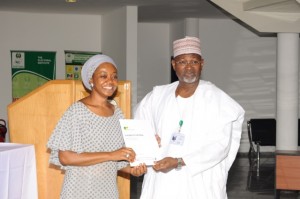
 The essence of the dialogue between the Independent National Electoral Commission (INEC) and a cross-section of female Nigerians, was to create the space for a frank discussion about the experiences of women and young girls as voters, candidates and members of the public around elections. The session which was facilitated by the Nigerian Women Trust Fund, had in attendance the Chairperson of INEC, Prof. Attahiru Jega, the Honourable Minister of Women Affairs & Social Development represented by the Director of Women Affairs, Mrs. Iran Ajufo; 5 out of 12 National Electoral Commissioners: Haj. Amina Zakari, Dr. Ishmael Igbani, Dr. Chris Iyimoga, Dr. A Oniyangi and Ambassador Lawrence Nwuruku as well as the first female Secretary to INEC, Mrs. Augusta Ogawku.
The essence of the dialogue between the Independent National Electoral Commission (INEC) and a cross-section of female Nigerians, was to create the space for a frank discussion about the experiences of women and young girls as voters, candidates and members of the public around elections. The session which was facilitated by the Nigerian Women Trust Fund, had in attendance the Chairperson of INEC, Prof. Attahiru Jega, the Honourable Minister of Women Affairs & Social Development represented by the Director of Women Affairs, Mrs. Iran Ajufo; 5 out of 12 National Electoral Commissioners: Haj. Amina Zakari, Dr. Ishmael Igbani, Dr. Chris Iyimoga, Dr. A Oniyangi and Ambassador Lawrence Nwuruku as well as the first female Secretary to INEC, Mrs. Augusta Ogawku.
Participants were drawn from civil society members, development partners, women groups (market women’s association, NCWS), persons with disabilities, faith-based organizations (FOMWAN, Women of Mercy Foundation), women in government, students from secondary schools and tertiary institutions and the media.
Focus of the dialogue
The dialogue covered INEC’s internal preparations; the public focused plans for voter registration etc. and the experiences and aspirations of the audience as stakeholders in the election process.
1. Voters’ registration & Improving Technology
INEC shared the plans for continuous voters registration which will start with Ekiti in a few weeks, then Osun, before the rest of the country join the process. To strengthen the electoral process, INEC has focused on: improving the integrity of the Voters Register; easy transfer of a voter’s registration from one location to another and using technology (e.g., electronic card readers) to limit the harm from the sale of voter’s cards etc.
2. INEC and gender mainstreaming
The role and influence of the head of the gender desk has been enhanced by the appointment of a deputy director to head the gender division and Prof Jega informed the audience that a final draft of the INEC gender policy would soon be released and he hoped to engage similar platforms to validate it before it is finalized and implemented. A participant pointed out that the next step would be for INEC’s budget to become gender responsive, which is something stakeholders should watch out for in the draft gender policy.
3. Voting and persons with disability
Sadly, the use of schools and public institutions which make no physical provision for people with disabilities is not something that INEC can address. However, the support for the blind in casting their votes etc. and the creation of a disability desk in INEC are things which INEC has implemented which should ease some of the challenges. The news about a desk catering to people living with disabilities raised the important issue of representation and if people who do not live with disabilities can be effective advocates.
4. General challenges faced by womencross section 2
The issue of leveling the playing field by monitoring the campaign spend of candidates during elections was addressed and so were the irregularities of polling units (and registration desks) which make it harder for women as the primary care givers at home to spend too much time waiting for polling and registration officials to turn up. Security is also a concern for women – an issue which keeps many away from the polling units. The perspectives of the participants are useful in adding to the pressure on INEC to ensure better logistics and planning during the next round of elections.
5. Strengthening women’s political participation
The Women’s Fund shared its Eligibility Criteria with the audience and INEC. It serves as a useful guide for women who are interested in running for office, or for women who want to improve their campaigns. It also serves as an internal assessment tool for women who want to access support from the Women’s Fund.
Next Steps & Opportunities
For the various stakeholders in the election process i.e., CSOs, women’s lobbying groups, consultants and concerned citizens the opportunities for engaging with and influencing the next elections include the following:
⦁ contributing to the validation of the INEC gender policy
⦁ continuing the lobbying for meaningful reforms in the Constitution and the Electoral Act to enhance women’s political participation until the process ends
⦁ preparing for grassroots communication campaigns on voter registration exercise and civics
⦁ partnering with INEC’s project on engaging secondary schools with civics clubs; starting early is key
⦁ Distributing the Eligibility Criteria amongst all the relevant stakeholders
Acknowledgements
The event was supported in kind by UNDP-DGD, IRI, OSSAP-MDGS and the Federal Ministry of Women Affairs and Social Development. The Board and management team of the Women’s Fund is grateful for their support and for the commitment of the media and all those who took time out of busy schedules to share their voice and thoughts.
info@nigerianwomentrustfund.org
www.nigerianwomentrustfund.org
Please follow us on Twitter: @genderfactor
Please join us on Facebook: Nigerian Women Fund
